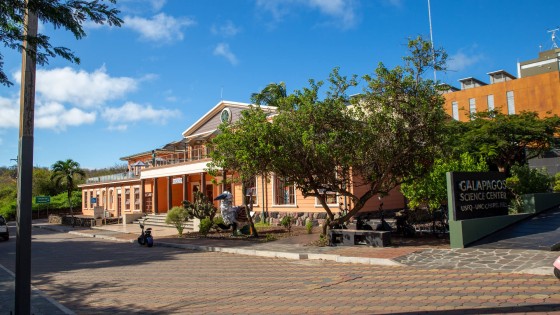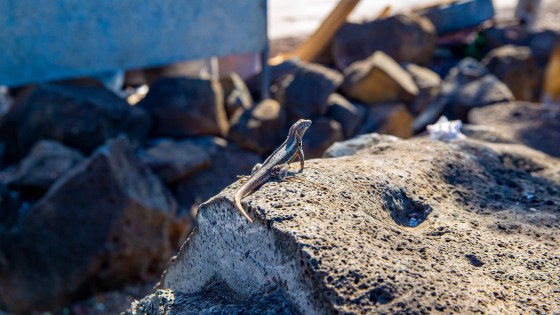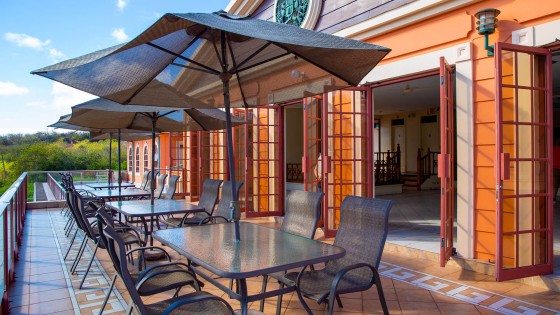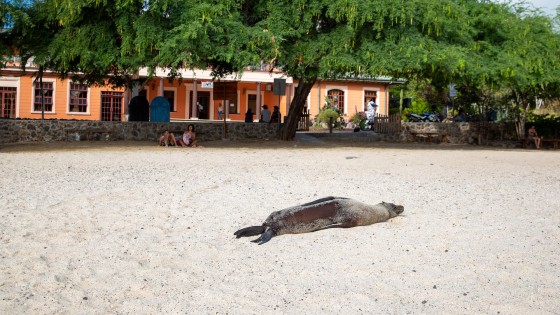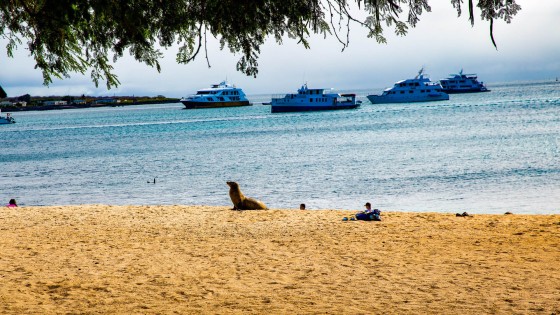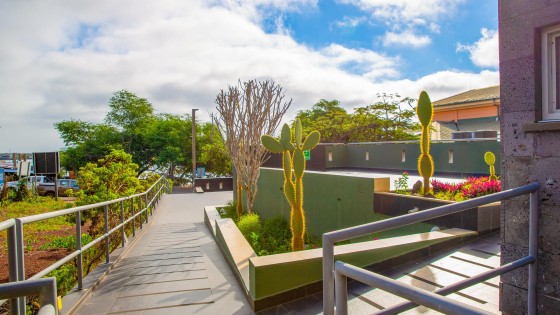APRU SCL Annual Conference - Galapagos 2023
This time, APRU SCL 6th Annual Conference will have an approach to urban problems inserted in natural protected areas. And Participants will come from the Pacific shores, to share their knowledge, and they will adapt their works to the conditions that could be only found in the same place where Charles Darwin started his scientific masterpiece.
Introduction: Our fragile future
Our world is amid a climate crisis with unpredictable consequences. Every day, we are bombarded with news about flooding, wildfire, drought, and melting polar ice caps. The number of extinct species is growing faster than ever. To assure our survival, humankind must go beyond reducing natural resource exploitation and fossil fuel consumption. We must look forward into an uncertain future and plan contingencies across a range of novel scenarios.
As a species, we have survived thanks to one of our best inventions: the city. Urban settlements provide us shelter from predators and natural disasters, while creating hubs of innovation and economic activity. But sometimes, cities turn into our Achilles heel. During the Industrial Revolution, cities were epicenters for the spread of human diseases. Now, they pose the greatest risks for humanity under increasingly unpredictable natural disasters. Citizens around the world must reduce their impact on the environment by changing their way of living, while trying to heal the wounds to Earth’s ecosystems.
APRU SCL
The mission of the APRU Sustainable Cities and Landscapes Hub is to advance the sustainability of human and earth systems through co-production of knowledge that leads to actionable plans for enhancing supportive relationships between cities and their local and regional landscapes. Our investigations focus on four sets of processes: those internal to cities, those occurring within surrounding landscapes, those occurring across urban-rural boundaries, and finally, telecoupling, the transfer of goods and services that connect cities to distant landscapes and economies. Five principles guide our efforts: scholarship for transformative action; common issues and localized solutions; broad geopolitical representation; support for underrepresented communities and vulnerable populations; and the centrality of climate change.
Galapagos
The Galapagos islands are without doubt one of the most researched places in the world. Nevertheless, one species has not been studied enough: humans.
Because of its unique circumstances, this archipelago is the perfect place to learn about the conflicts and benefits of coexistence between human developments and natural protected areas near one another.
Solutions must resonate to the small local communities that inhabit the islands. As they become aware of their impacts on their environment, what choices might be available to reduce those impacts?
Robust planning could lead to a new balance, in which humans take care of nature by innovating new ways of living; and nature teaches the best ways to adapt human practices to the changing local climate and environment.
The Galapagos could be seen as a testing ground where problems that are common to most cities take sharp focus. Since the natural context is such a critical factor there, it is for sure they must be environmentally friendly.
The conference
The APRU SCL 6th Annual Conference will use the Galapagos as an opportunity to focus on urban problems inserted in natural protected areas. Participants will come from around the Pacific Rim to share their knowledge, while learning from the people and landscape of the place where Charles Darwin started his scientific masterpiece, “On the Origin of Species”.
Working Groups
The SCL Hub uses a “working group” framework to produce actionable knowledge and plans from each annual conference. Rather than focusing on disseminating research that has already been completed, conferences focus on collaboration among participants to build agendas for research and action. Many of the working groups will continue from previous years conferences but will be adjusted to focus on the particular circumstances of the Galapagos archipelago.
Urban Landscape Biodiversity
Galapagos has permanent conflicts between endemic species and those introduced by humans. The introduced ones tend to compete with the locals, affecting their breeding, growth and survival. Urban areas are no exception: endemic birds are changing their behaviors, taking food from hotels and restaurants instead of their natural environment.
Water, Waste Water & Global Health
Water the most critical issue in the Galapagos nowadays. Only 1 of the 4 inhabited islands has a permanent source of drinkable water. Santa Cruz, the most populated island, obtains its water from underground springs, which have been polluted by infiltration from septic wells.
Sustainable Urban Design & Transitions in Waterfronts
Urban settlements on the islands have restrictions on their territorial growth since they are surrounded by the national park area. Even so, some towns have expanded or plan to expand their territory. New urban growth strategies and design alternatives to reduce development impacts on their natural surroundings are critical.
Future Energy Landscapes and Vulnerable Communities
Eighty percent of the Galapagos energy is obtained from fossil fuels. The rest comes from wind and solar power. The chance to increase renewable energy use is there to be taken, but no one has planned a clear path to it.
This working group will explore how renewable power production can be integrated with other productive uses and biodiversity. The USFQ has many research projects about this issue.
Schedule
| HOUR | FRI 4 | SAT 5 | SUN 6 | MON 7 | TUE 8 | WED 9 | THU 10 | FRI 11 |
|---|---|---|---|---|---|---|---|---|
| 07:00 - 07:30 | Recommended arrival to Quito | Travel to San Cristobal Island, Galapagos Islands. | Recommended departure to Quito. Optional individual tours around the archipelago | |||||
| 07:30: - 08:00 | ||||||||
| 08:00 - 08:30 | ||||||||
| 09:00 - 09:30 | Students Day Presentations | Working Group Sessions | Working Group Sessions | |||||
| 09.30 - 10:00 | ||||||||
| 10:00 - 10:30 | ||||||||
| 10:30 - 11:00 | Coffee Break | Coffee Break | Coffee Break | |||||
| 11:00 - 11:30 | SCL Leadership Meeting with USFQ Team | Students Day Presentations | Working Group Sessions | Working Group Sessions | ||||
| 11:30 - 12:00 | ||||||||
| 12:00 - 12:30 | ||||||||
| 12:30 - 13:00 | ||||||||
| 13:00 - 13:30 | Inaguration Lunch | Arrival Lunch in San Cristobal | Lunch | Lunch | Lunch/SCL Leadership Lunch | |||
| 13:30 - 14:00 | ||||||||
| 14:00 - 14:30 | ||||||||
| 14:30 - 15:00 | Event Innaguration | Visit to Interpetation Center | Research Presentations in Working Group Session | Working Group Sessions | Working Groups Report Out | |||
| 15:00 - 15:30 | Optional tour around Quito's Historic Center | Senior Lecture #1 & 15 min. Break | ||||||
| 15:30 - 16:00 | Guided Visit around USFQ GAIAS Campus and Galapagos Science Center | |||||||
| 16:00 - 16:30 | Senior Lecture #2 and 15 min. Break | Summit Conclussions | ||||||
| 16:30 - 17:00 | Recommendations for San Cristobal | Interaction among Working Groups | ||||||
| 17:00 - 17:30 | Working Group Showcase | |||||||
| 17:30 - 18:00 | ||||||||
| 18:00 - 18:30 | Optional Lunch in the Historic Center | Event Closure | ||||||
| 18:30 -19:00 |
Registration
The fees below do not include plane tickets, hotel expenses and The Galapagos National Park fees. Lunches and Coffee breaks are included only when they are in the event’s schedule.
Full Package:
This Includes the Conference Sessions in Quito and the Conferences and Working Groups in the Galapagos.
| Early Bird Registration | Official Registration | Late Registration |
|---|---|---|
| May 11 to Jun 8 | from Jun 9 – July 15 | from July 16 to August 5 |
| US$ 450.00 | US$ 500.00 | US$ 550.00 |
Presential Assistance to Quito Conference:
This option only Includes the one-day Conference in Quito on Sunday, August the 6th.
| Early Bird Registration | Official Registration | Late Registration |
|---|---|---|
| May 11 to Jun 8 | from Jun 9 – July 15 | from July 16 to August 5 |
| US$ 150.00 | US$ 200.00 | US$ 250.00 |
Virtual Attendance to Quito Conference:
This option is only to attend the one-day conferences in Quito on Sunday, August the 6th.
| Early Bird Registration | Official Registration | Late Registration |
|---|---|---|
| May 11 to Jun 8 | from Jun 9 – July 15 | from July 16 to August 5 |
| US$ 75.00 | US$ 125.00 | US$ 175.00 |
Please, DO NOT FORGET to fill up THIS FORM, after finished your registration.
It will help us to provide you a better experience, during your stay in Ecuador.
Travel Arrangements
Flights:
Please contact Lorena Vega lorena.vega@tguio-viajes.com and Omar Mori omar.mori@tguio-viajes.com from T-Guio travel agency to book your flights to Galapagos. The flight for the conference will leave from Quito (UIO) on August 7 and will come back from San Cristobal (SCY) on August 11. If you would like to stay longer in the islands, please feel free to mention this to Omar and Lorena.
Accommodation:
Hotels in Quito:
| HOTEL | CONTACT PERSON | PHONE | WEBSITE | |
|---|---|---|---|---|
| Holiday Inn Quito Airport | Maria Elisa Yugsi | +593 93 913 1427 | myugsi@hiuio.com | https://www.ihg.com/holidayinn/hotels/us/es/quito/uioap/hoteldetail |
| EB by Eurobuilding | Diego Mendez | +593 98 121 9023 | diegomendez@ebhotels.com | https://www.ebhotels.com/quito |
| Wyndham Quito Airport | https://www.wyndhamhotels.com/es-xl/wyndham/quito-ecuador/wyndham-quito-airport/overview |
On the day of the event in Quito, transportation will be provided from these hotels to all the attendees. When booking, please feel free to mention that you are with the APRU-SCL group to get the special USFQ rate.
Hotels in San Cristobal:
| HOTEL | MANAGER | PHONE | |
|---|---|---|---|
| Miconia | Catalina Espinel | (+593)98 693 6975 | hotelmiconia@yahoo.com |
| Sea side | Pamela Cobos | (+593)98 693 6975 | hotelmiconia@yahoo.com |
| Casa Playa Mann | Jose Guerrero Vela | (+593)96 784 7260 | info@casaplayamann.com |
| Hostal Andry | Olivia Rogel Jimbo | (+593)98 973 3011 | hostal_andry@outlook.es |
| Royal Galapagos Inn | Eduardo Veliz | (+593)96 838 2161 | royalgalapagos22@gmail.com |
| Hotel Blue Marlin | Marcos Ballesteros | (+593)98 870 1424 | info@bluemarlingalapagos.ec |
| Hotel Casa de Nelly | Nelly Saltos | (+593)99 164 5580 | saltosnelly@hotmail.com reservacasadenelly@gmail.com |
| Hotel Casa Opuntia | Tatiana Jijon | (+593)99 481 6754 | tatianaa@opuntiahotels.com |
| Hotel Casa Blanca | Daddy Velez | (+593)99 637 4212 | casablancagalapagos@gmail.com |
| Hotel Galapagos Planet | No definido aún | (+593)5 2520 419 | mafer.0199@gmail.com hotelgalapagosplanet@hotmail.com |
| Hotel Golden Bay & Spa | Luciana Bianchi | (+593)97 872 6293 | sales@goldenbay.com.ec |
| Grand Hotel Chatham | Bety Cruz Rivas | (+593)98 717 1431 | chathamhotel@hotmail.com |
Sightseeing in Ecuador:
Quito:
Explore the historic center and wander through the UNESCO World Heritage Site, visit the Plaza Grande, the Presidential Palace, and the Cathedral. Climb to the top of the Basilica del Voto Nacional for panoramic views of Quito. Take a cable car ride, known as the TelefériQo, to the top of the Pichincha Volcano for breathtaking views of the city and surrounding mountains. Visit the Middle of the world and experience all the phenomenon that happen because of this unique location.
Otavalo:
Explore the famous Otavalo Indigenous Market, where you can find traditional textiles, crafts, and fresh produce. Visit the stunning Peguche Waterfall located near the town and enjoy the peaceful surroundings. Take a boat ride on the crater lake of Cuicocha and hike around its rim to enjoy the scenic beauty.
Tandayapa:
Visit USFQ’s new biodiversity station located in the cloud forest of Tandayapa, about two hours away from Quito. Go birdwatching in the beautiful trails of the station.
Baños:
Relax in the thermal baths that are naturally heated by volcanic activity. Live the adventure by hiking, biking, or zip-lining in the beautiful surrounding mountains and waterfalls. Visit the impressive Pailon del Diablo waterfall and take a thrilling walk behind the cascading water.
Cotopaxi National Park:
Hike up to the refuge or engage in a more challenging climb to the summit of this active volcano. Enjoy a scenic walk around the Limpiopungo lake while observing the unique birdlife and highland fauna. Explore the park's stunning landscapes on horseback
Puerto Lopez:
Take a boat tour to Puerto Lopez island, often referred to as the "Poor Man's Galapagos," and spot various bird species, including the blue-footed booby. From June to September, embark on a boat trip to observe humpback whales in their natural habitat. Explore the Machalilla National Park protected area, hike through lush forests, visit secluded beaches, and learn about the park's conservation efforts.
Tiputini Biodiversity Station:
Visit USFQ’s rainforest station located in one of the most biodiverse places on earth. Explore the Amazon rainforest with knowledgeable guides and spot diverse wildlife and plant species. *Have in mind that due to the logistics involved with getting to the station, the entry and exit days are only Monday and Friday.
San Cristobal Island:
Learn about the unique natural history and human settlement of the Galapagos Islands in the Interpretation Center. Snorkel or dive around the iconic Kicker Rock formation and swim with sea lions, rays, sharks and colorful fish. Relax on pristine beaches such as Playa Mann, Punta Carola, or La Loberia. Take a daytrip to the beautiful Española Island.
Santa Cruz Island:
Relax on the white sandy beach, swim, and snorkel in the clear waters of Tortuga Bay. Take a tour to the lush highlands of Santa Cruz to see giant tortoises roaming freely in their natural habitat. Visit Seymour Island or Bartolomé for the day.
Isabela Island:
Trek to the rim of the Sierra Negra volcano and enjoy breathtaking views of the surrounding landscapes. Snorkel with marine life, including sea turtles, penguins, and sharks, around the Tintoreras islets. Explore the historic Tagus Cove, hike to a viewpoint, and spot various bird species.
If you have any questions regarding potential site visits, please contact María Paz Ayala mayala@usfq.edu.ec
Other recommendations
- Remember that you must arrive in the airport 2 hours before your next flight when you travel from Quito to San Cristobal.
- The Galapagos National Park requires 2 payments. The first one is US$ 20.00 for the entrance permission, and the other is US$ 100.00 for entrance into the National Park. The first one must be paid in Quito, before getting into the plane, at a special counter for the Galapagos National Park. The other is paid in the San Cristobal airport, right after getting out of the plane. Both payments must be made paid in US dollars, cash.
- Wild animals should not be touched by humans. Sometimes, some species may share common spaces with humans, like beaches near urban settlements. People must keep 2 meters (6’6”) between them and sea lions, tortoises, marine iguanas, and some other creatures.
Student Event
A student symposium incorporated into the conference will allow young researchers to experience and be exposed to the valuable conversations of the APRU-SCL network. Students will present their work and PhD students will be partnered with an experienced mentor in their field for valuable insight and networking opportunities. Their work will help to create new fields of research linked to global sustainability, by adapting their experiences to the conditions existing in the Galapagos
Fill in the form here by June 30 to express your interests to join the student symposium.

